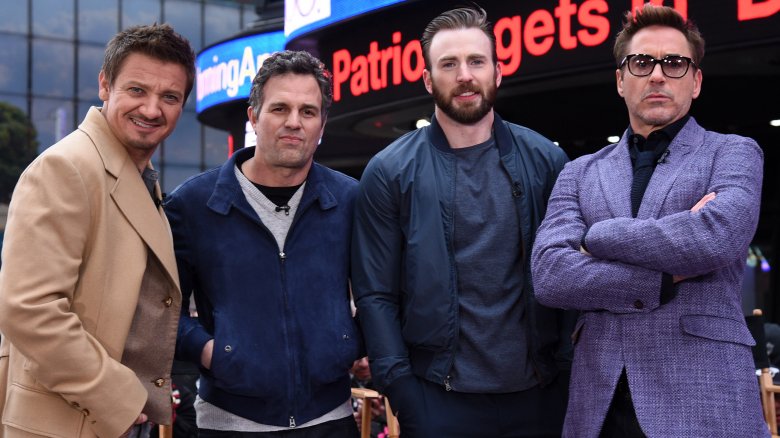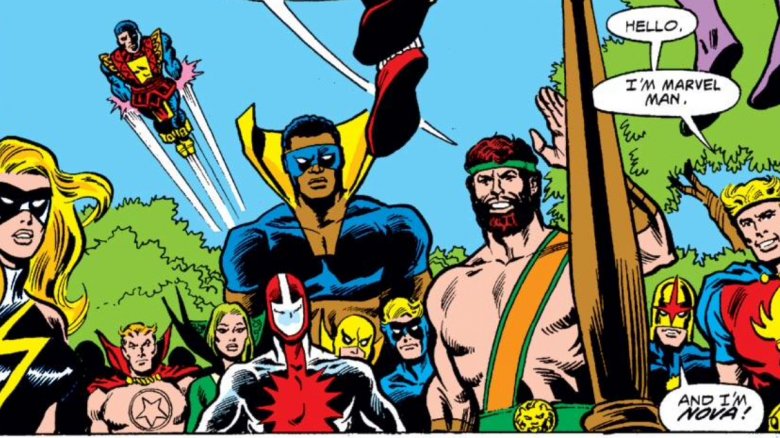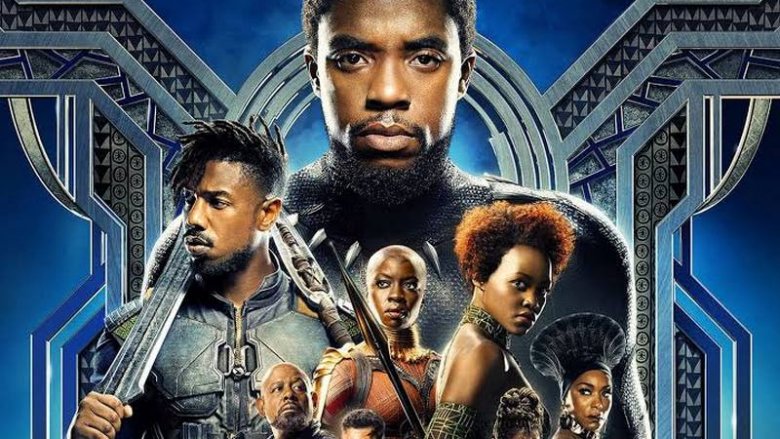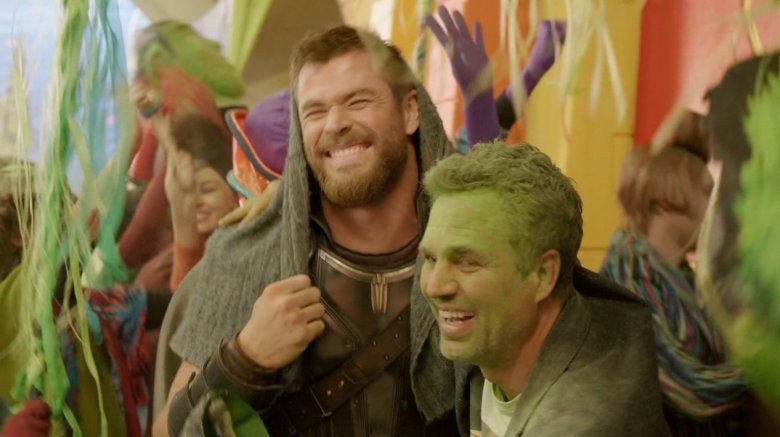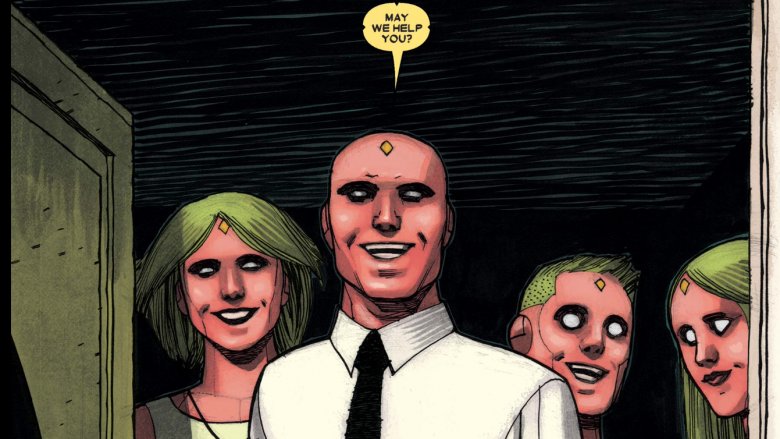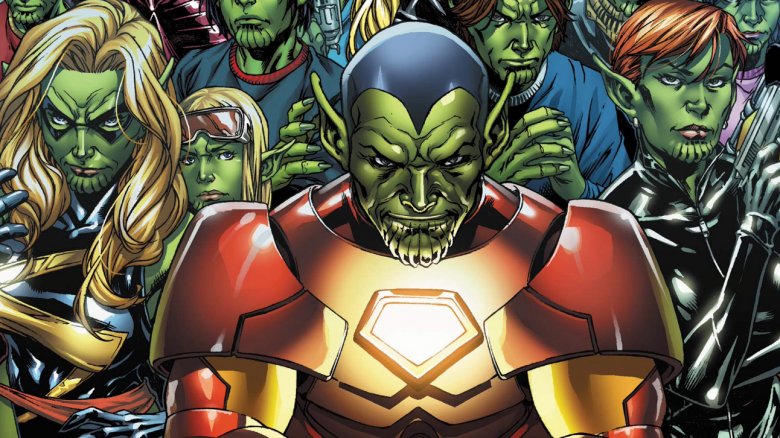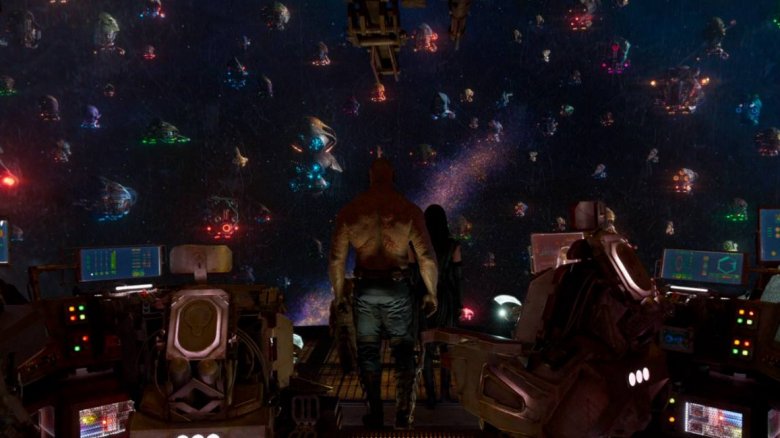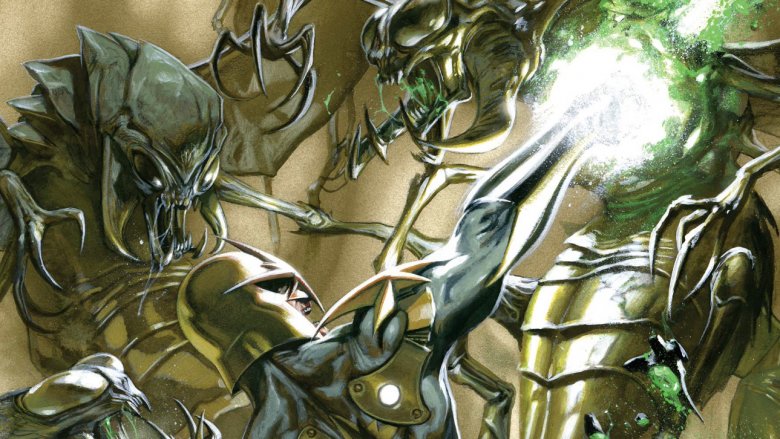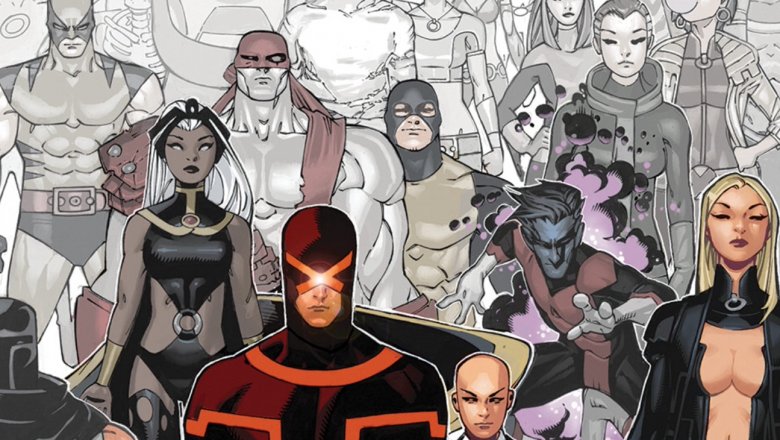After Infinity War: What's Next For The MCU
Infinity War is ready to begin, and we're already wondering what comes next. After waiting six years, Marvel movie fans are about to finally see Thanos the Mad Titan do what he does best — beat the tar out of a bunch of superheroes at once. Since that first mid-credits scene in 2012's Avengers, we've waited for Thanos to reveal himself to Marvel's heroes. Now that it's finally about to happen, it's tough to not wonder what'll happen afterward.
A lot has changed in the Marvel Cinematic Universe since Iron Man opened to a military convoy rolling through the desert to AC/DC's "Back In Black." Heroes have died. Some have forced themselves into exile. Others were injured, possibly permanently. Half the Avengers are fugitives. The lovable A.I. we once knew as Jarvis is now an android with an Infinity Stone embedded in his forehead. Asgard was blown to bits, and Mjolnir lies smashed on a clifftop in Norway.
Contracts of many of the top Marvel stars are ending with Avengers: Infinity War, helping to fuel questions of whether or not we'll see one or more of the MCU's most well loved heroes sacrificed in the upcoming film. New stars have risen, shocking the industry with record-breaking ticket sales. An African king replaced an American billionaire playboy as the MCU's top dog. In fact, most of the newest franchises Marvel Studios has enjoyed success with focus on characters whose comics have historically struggled to maintain enough readership to survive. We're seeing more diversity not only in the MCU's characters but in its filmmakers, as well as seeing Marvel be much more open about what kinds of stories it's willing to tell on the big screen.
With all that in mind and more, here's what's next after Infinity War.
Departures & Arrivals
The contractual obligations for many of the stars of the MCU end with Avengers: Infinity War. Rumors and reports have circulated for years that some of the Phase One stars would be unwilling to renew, particularly in the case of Robert Downey Jr. Consider that. Then consider how long Marvel has been teasing us with Thanos. Consider how Djimon Hounsou's Korath referred to him as "the most powerful being in the universe" in Guardians of the Galaxy. Consider the ramifications of such a claim when you think of the staggering power we've seen in villains like Hela, Surtur, and Ego. Consider just how many superheroes will appear in Avengers: Infinity War, and just how silly all the teasing and the buildup would seem if Thanos and his Black Order didn't kill at least one of the Avengers. Finally, consider that to get at one of the Infinity Stones in particular, either Thanos or one of his underlings will have to literally rip it from one of the Avengers' foreheads. When you think of all that, the odds don't look good that all of the Avengers will be above ground after Infinity War.
No matter who remains a part of the MCU after Infinity War, don't expect its ranks to shrink. At least not for long. Marvel's shown no signs of slowing down, and we'll see more stars filling new heroes' shoes. And the source material has no shortage of characters to pick from.
Open casting call
If you're trying to guess which new franchise will be introduced to the MCU and you're asking yourself, "Who's REALLY popular in the comics who hasn't shown up yet?" Stop right there – you're asking the wrong question.
If you judged Marvel film successes by Marvel Comics successes, Guardians of the Galaxy, Ant-Man, and Black Panther would never have been made. Before the release of the film Doctor Strange, the character hadn't been able to keep a solo title alive since the '90s. Really, if the success or failure of the films came close to mirroring the success or failure of the comics, there likely wouldn't even be an MCU, considering it began without a Peter Parker, without any X teams, and without any surly Canadians who punch steel claws through ninjas for fun.
The next big Marvel Studios film could be a B or C list hero or team like Moon Knight or the Thunderbolts. Or it could go right to the Y and Z list: We could see movies for Captain Ultra, the Great Lakes Avengers, the Stuntmaster, the Secret Defenders, or a hundred other characters only the most invested comic book fans even know about (and probably still laugh at). Anyone from Howard the Duck to Beta Ray Bill could be the next Marvel success.
Expect more diversity
The undeniable critical and commercial success of Black Panther should be enough to convince even the most doubtful cynic that after Infinity War, we should expect to see Marvel Studios doubling and tripling down on its commitment to diversity. Starring mostly actors of color, written and directed by people of color, Black Panther proved — if nothing else — there's no good reason to shy away from diversity. No moral reason, no cultural reason, and given the records Black Panther ticket sales smashed, certainly no financial reason.
The success is that much more impressive when you consider how hard Black Panther comic book creators have had to work to keep their titles afloat. The Black Panther of the late '90s and early aughts which the film borrowed from heavily (the Dora Milajae were introduced in that run, as was T'Challa's love interest Nakia and the U.S. federal agent Everett K. Ross) was a favorite of critics but one of the publisher's least-read titles of its era. It was constantly threatened with cancellation and finally ended with its 62nd issue.
With the success of Black Panther, the highly anticipated Captain Marvel waiting in the wings, Avengers: Infinity War's ensemble cast featuring numerous people of color and women, the persistent whispers of a solo Black Widow movie, and a still largely untapped reserve of Marvel comics characters waiting for their names to be called – Marvel movie fans should expect to not only see more woman heroes and heroes of color, but their real-life counterparts writing and directing.
Expect more laughs
Marvel movies are funny, and they'll continue to be funny.
Many of the most well-remembered moments in the MCU's films are those laced with humor. The Hulk's merciless thrashing of Loki at the end of Avengers and his sideways-sucker-punch of Thor a few minutes earlier, a talking raccoon on the shoulder of a talking tree making like Pacino in the last scene of Scarface, Drax yelling with murderous rage at Gamora "I am not a princess," the running "Baskin Robbins don't play" gag in Ant-Man, Ben Kingsley's faux Mandarin, Wong listening to Beyoncé while Strange steals all of his library books, the Darryl one-shots, the post and mid credits scenes, and of course the hilarious and somewhat disturbing "Disco Inferno" music video on the Guardians of the Galaxy, Vol. 2 Blu-ray.
Marvel has learned that, ironically, taking themselves less seriously has helped audiences and critics take their films more seriously. More importantly, with Thor: Ragnarok, Marvel learned that humor could be one of the key components to rejuvenating one of its first, and least successful, franchises. In fact, of the few negative reactions there were to Ragnarok, the notion that it was too funny was often mentioned.
It's arguable that in a narrative with giant green monsters and talking raccoons, there couldn't be such a thing as too funny. Regardless, don't expect the laughs of the MCU to let up any time soon.
Expect more variety
Marvel Studios already has a healthy variety of franchises. We've had the fantasy adventures of Thor and Doctor Strange, the space adventures of the Guardians of the Galaxy, the teen angst flavor of Spider-Man: Homecoming, the espionage thrillers that were the last two Captain America additions, the political drama of Black Panther, and the heist/comedy Ant-Man.
One of the things that connects all the franchises and all the films is that they're all, at least in part, action films. As the MCU grows, we should expect to see it give us other kinds of action flicks, but we should also expect it to make room for even more.
Take, for example, the 2015 Marvel comic book series Vision. The android Avenger is assigned as the President's super-powered bodyguard. Vision takes the opportunity to literally create a family. He makes an android wife, android daughter, and android son. He moves them all into a Washington D.C. suburb and tries to live like the rest of the people in the neighborhood, to be accepted by them. The first issue ends with a supervillain attacking the home while Vision is away. His android wife Virginia kills the villain and, rather than tell her husband, Virginia and her son hide the body.
The point being that while Vision was a superhero comic, it was not an action comic. There's no reason why the MCU couldn't branch out into genres lighter on action.
Secret Invasion
With Captain America: Civil War, we've already seen a truncated version of one of Marvel's company-wide events adapted to screen. We're about to see another with Avengers: Infinity War. It's doubtful it will be the last, and one of the events most likely to be picked after Infinity War is Secret Invasion.
Secret Invasion saw the skrulls, a race of shape-shifters who can make themselves look and sound like whoever they choose, infiltrating Earth and the ranks of the its superheroes. It was revealed that some characters, such as Hank Pym (the original Ant-Man), had been skrulls in disguise for years.
One reason it makes sense is that would be at least a little bit different than the usual powerful-guys-fight-powerful-guys Marvel superhero film. A story in which the heroes of Marvel don't know which of their comrades could be a skrull, which ones might have been replaced by skrulls for years, would add an element of genuine suspicion and distrust between the heroes that we didn't even see in Captain America: Civil War. Another reason is Disney's acquisition of Fox. The skrulls first appeared in Fantastic Four and are strongly associated with them. Should Marvel Studios decide to bring the FF to the MCU, a film with the skrulls might offer a good opportunity.
Finally, there's the fact that the MCU is aging, and the older it gets, the more complex the continuity. Hypothetically, let's say one of the Avengers gets killed off in Infinity War. Then let's say a few years from now, Marvel decides it wants the character back in the films and the actor agrees. How do they do it?
That guy was a skrull. This one is the real deal. No worries.
Reach for the stars
One of the corners of the Marvel Universe that has found nothing but success is that of the cosmos. Both Guardians of the Galaxy films were hits. And, like humor, the cosmic element added to Thor: Ragnarok was a key ingredient to turning around the franchise. While the first Avengers brought us an alien invasion, with Thanos finally assaulting Earth, Avengers: Infinity War promises an even stronger attachment to Marvel's cosmic mythology than ever.
With Quasar, Nova, Adam Warlock, Moondragon, and more, there are almost as many heroes among the stars as there are on Marvel's Earth. And the acquisition of Fox's properties opens even more doors. The Fantastic Four are cosmic explorers. Some of the X-Men's most well-loved stories take place in the stars. With all the success Marvel has had in space, and the fact that its audience is now familiar enough with its cosmic mythology to not burden future films with extraneous explanations, there is no reason to think Marvel won't explore other cosmic franchises.
Annihilation
While pro-registration and anti-registration heroes were duking it out on Earth in the original version of Civil War, Marvel's long-neglected cosmic characters were busy fighting off the insect hordes from the Negative Zone in Annihilation. Forgotten space heroes like Nova, Silver Surfer, Quasar, and Drax the Destroyer returned from obscurity. And even villains Ronan the Accuser, Super-Skrull, and Thanos fought on the side of the angels.
It's not a given that the MCU will see an adaptation of Annihilation. But it seems a natural progression that — whatever all-encompassing storyline replaces Thanos' search for the Infinity Stones — it will culminate in an Annihilation-esque interstellar war. How do you follow up Thanos assaulting Earth's superheroes with super-powered cronies and alien legions? You get those super-heroes in spaceships and send them into the great dark beyond to fight the wars among the stars that Thanos and his ilk would rather wage on Earth.
Maybe it won't be Annihilation. Maybe it will be The Kree-Skrull War or the Asgard/Shi'ar War or something completely new. Regardless, sooner or later, we should expect to see the heroes of Marvel taking the fight to the cosmos.
Paving the way for the X-Men
With Disney's acquisition of Fox, it's inevitable we'll see the X-Men in the MCU. There's no way yet to know when that will happen, but what we can expect is that if Marvel Studios isn't preparing for their introduction, they will be soon. But there's a problem with the X-Men in the MCU. It's not an insurmountable one, but it's there.
The X-Men are the rebels. They're the hunted. The hounded. They're the guys who risk their lives for a world that hates, fears, and distrusts them. But in the MCU where every man, woman, and child has already seen super-powered beings lay waste to major cities, how do the X-Men make sense?
In other words, how will the X-Men distinguish themselves from the Avengers and other heroes? The X-Men are hated and mistrusted? Well, so are the Avengers. That's what Captain America: Civil War was about. As early as the end of the first Avengers, we see news clips of people talking about how much they fear the team. In a first season episode of Jessica Jones, a couple lures the main character into an apartment so they can murder her just because she has powers.
There's a dude with a hammer who can control the weather and his buddy the green monster who can knock down buildings because he's not feeling great. And you're afraid of a teenage girl who can walk through walls?
Which isn't to say, again, that the X-Men problem is an unsolvable one. Like the clichés tell us, maybe it will turn out to just be an opportunity. While we're all wondering what's next after Infinity War, Marvel Studios is already preparing its narrative for the coming of the X-Men, and we should expect to see those preparations soon.
